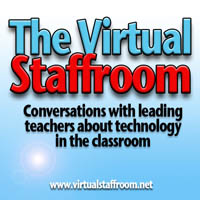 I’m a huge believer in the notion of trust and respect as the primary drivers in the relationship between student and teacher. People have occasionally told me that I’m just incredibly naive about this, but all I can talk from is my own experience, and in my own experience, building relationships of trust, respect and genuine care between student and teacher is the foundation upon which all “policy” rests on in my classroom. I realise that school administrators will feel a need for something a little more concrete than this, but any policies, AUPs or guidelines that aren’t based on this first rule are simply not sustainable in my view.
I’m a huge believer in the notion of trust and respect as the primary drivers in the relationship between student and teacher. People have occasionally told me that I’m just incredibly naive about this, but all I can talk from is my own experience, and in my own experience, building relationships of trust, respect and genuine care between student and teacher is the foundation upon which all “policy” rests on in my classroom. I realise that school administrators will feel a need for something a little more concrete than this, but any policies, AUPs or guidelines that aren’t based on this first rule are simply not sustainable in my view.
Take blocking and filtering for example. While school boards have the best of intentions for protecting students when they block access to web 2.0 tools and other social technologies, such policies fail the trust and respect test, because they start with an assumption that bestows upon the students neither trust nor respect.
Or what about when a school tells students that their mobile phones will be confiscated if seen? Again, this approach treats students with neither trust nor respect.
Forcing students to complete work that appears meaningless to them, asking them to remember facts that seem unconnected or pointless, again treats kids with neither trust nor respect.
So, yes, when policy makers make policies, I believe they need to think about it in terms of providing an environment of trust and respect first, and then expecting students to work within guidelines that honour that trust and respect that they have been offered.
For example, having a mobile phone in school or in class is not really a problem if it’s use is bound by behaviour that treats the student with the trust to know when and how to use it the correct way, and the respect to assume that they will. Instead of jumping up and down and reading them the riot act if we so much as even see their cell phone, perhaps we need to expect that they are welcome to carry one as long as it doesn’t get used inappropriately… after all, isn’t that how most adults would wish to be treated? Imagine if schools confiscated cell phones from teachers.There would be an outcry and a resounding “Don’t they trust us to do the
right thing?!” from staff, as they felt a sense of violation at their employers assumption that phones would be used inappropriately. As teachers, we would feel as though we were not trusted, we were not respected, and that our ability to make sound decisions was in question before we’d even done anything wrong. I have never seen an employer make those sorts of draconian rules for their employees, but I hear about it happening from schools all the time with regard to their students. I can only imagine how untrusted and unrespected our students must feel when placed in a similar situation. I’m not suggesting that that school policy should be a free-for-all where kids just do whatever they want. Far from it. I do however think that kids should be given the opportunity to prove they can do the “right thing” before we set up policies that automatically assume they won’t.
I see the same sorts of thinking when it comes to Internet access policies. Blocking access to the web becomes far less necessary if we begin with a fundamental assumption of trust that our students will do the right thing, backed up with the respect that they are capable and able to make those decisions for themselves. Instead of assuming the worst, how much better would the environment we create in our schools be if they were based on trust, respect, and a belief that students want to do the right thing if given the chance.
I really do believe that we get what we expect. As long as we create environments that are based on the expectation that students will do the wrong thing, they probably will. Funnily enough, if we start to create environments where we expect our students to do the right thing, they will usually do that too. They will give us whatever we expect from them, but mostly, school policies are set up to expect the worst.
Seriously, what’s the worst thing that could happen if we created an environment of trust and respect?
Image: ‘James,
I think your cover’s blown!‘
http://www.flickr.com/photos/23912576@N05/2962194797
 In this new episode of the Virtual Staffroom podcast I have the great pleasure of enjoying a casual chat with the enigmatic Professor Stephen Heppell. With a story for just about every occasion, Stephen is a absolute mine of great insights and perspectives about the future of education.
In this new episode of the Virtual Staffroom podcast I have the great pleasure of enjoying a casual chat with the enigmatic Professor Stephen Heppell. With a story for just about every occasion, Stephen is a absolute mine of great insights and perspectives about the future of education.
 I’m a huge believer in the notion of trust and respect as the primary drivers in the relationship between student and teacher. People have occasionally told me that I’m just incredibly naive about this, but all I can talk from is my own experience, and in my own experience, building relationships of trust, respect and genuine care between student and teacher is the foundation upon which all “policy” rests on in my classroom. I realise that school administrators will feel a need for something a little more concrete than this, but any policies, AUPs or guidelines that aren’t based on this first rule are simply not sustainable in my view.
I’m a huge believer in the notion of trust and respect as the primary drivers in the relationship between student and teacher. People have occasionally told me that I’m just incredibly naive about this, but all I can talk from is my own experience, and in my own experience, building relationships of trust, respect and genuine care between student and teacher is the foundation upon which all “policy” rests on in my classroom. I realise that school administrators will feel a need for something a little more concrete than this, but any policies, AUPs or guidelines that aren’t based on this first rule are simply not sustainable in my view.